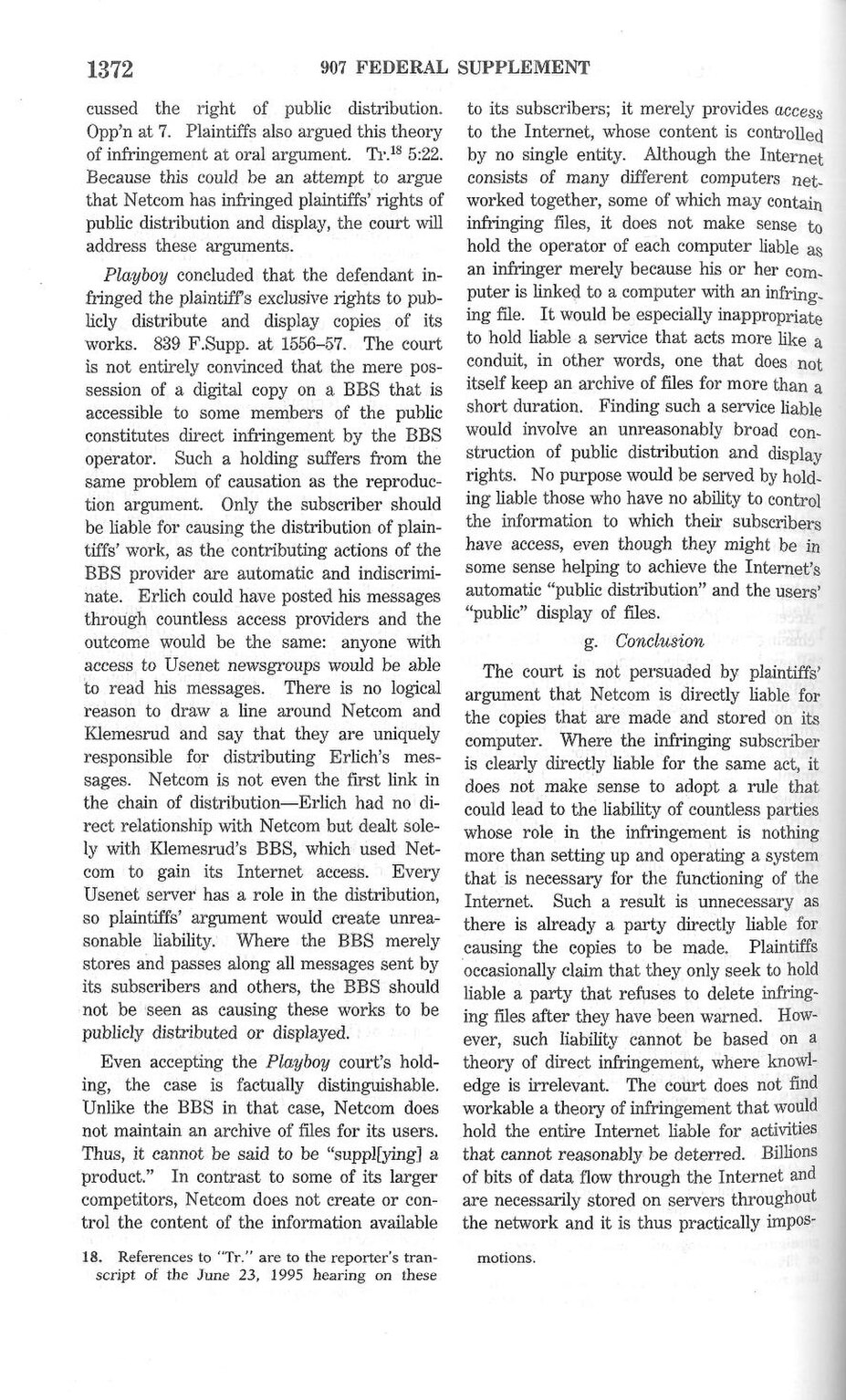cussed the right of public distribution. Opp’n at 7. Plaintiffs also argued this theory of infringement at oral argument. Tr.[1] 5:22. Because this could be an attempt to argue that Netcom has infringed plaintiffs’ rights of public distribution and display, the court will address these arguments.
Playboy concluded that the defendant infringed the plaintiff’s exclusive rights to publicly distribute and display copies of its works. 839 F.Supp. at 1556–57. The court is not entirely convinced that the mere possession of a digital copy on a BBS that is accessible to some members of the public constitutes direct infringement by the BBS operator. Such a holding suffers from the same problem of causation as the reproduction argument. Only the subscriber should be liable for causing the distribution of plaintiffs’ work, as the contributing actions of the BBS provider are automatic and indiscriminate. Erlich could have posted his messages through countless access providers and the outcome would be the same: anyone with access to Usenet newsgroups would be able to read his messages. There is no logical reason to draw a line around Netcom and Klemesrud and say that they are uniquely responsible for distributing Erlich’s messages. Netcom is not even the first link in the chain of distribution—Erlich had no direct relationship with Netcom but dealt solely with Klemesrud’s BBS, which used Netcom to gain its Internet access. Every Usenet server has a role in the distribution, so plaintiffs’ argument would create unreasonable liability. Where the BBS merely stores and passes along all messages sent by its subscribers and others, the BBS should not be seen as causing these works to be publicly distributed or displayed.
Even accepting the Playboy court’s holding, the case is factually distinguishable. Unlike the BBS in that case, Netcom does not maintain an archive of files for its users. Thus, it cannot be said to be “suppl[ying] a product.” In contrast to some of its larger competitors, Netcom does not create or control the content of the information available to its subscribers; it merely provides access to the Internet, whose content is controlled by no single entity. Although the Internet consists of many different computers networked together, some of which may contain infringing files, it does not make sense to hold the operator of each computer liable as an infringer merely because his or her computer is linked to a computer with an infringing file. It would be especially inappropriate to hold liable a service that acts more like a conduit, in other words, one that does not itself keep an archive of files for more than a short duration. Finding such a service liable would involve an unreasonably broad construction of public distribution and display rights. No purpose would be served by holding liable those who have no ability to control the information to which their subscribers have access, even though they might be in some sense helping to achieve the Internet’s automatic “public distribution” and the users’ “public” display of files.
g. Conclusion
The court is not persuaded by plaintiffs’ argument that Netcom is directly liable for the copies that are made and stored on its computer. Where the infringing subscriber is clearly directly liable for the same act, it does not make sense to adopt a rule that could lead to the liability of countless parties whose role in the infringement is nothing more than setting up and operating a system that is necessary for the functioning of the Internet. Such a result is unnecessary as there is already a party directly liable for causing the copies to be made. Plaintiffs occasionally claim that they only seek to hold liable a party that refuses to delete infringing files after they have been warned. However, such liability cannot be based on a theory of direct infringement, where knowledge is irrelevant. The court does not find workable a theory of infringement that would hold the entire Internet liable for activities that cannot reasonably be deterred. Billions of bits of data flow through the Internet and are necessarily stored on servers throughout the network and it is thus practically impos-
- ↑ References to “Tr.” are to the reporter’s transcript of the June 23, 1995 hearing on these motions.
